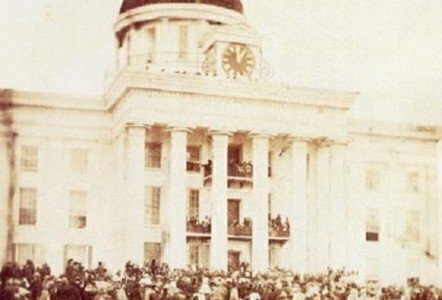On this day in 1861, former U.S. Senator Jefferson Davis took to a podium for his presidential inaugural and gave an impassioned speech about the Constitution. Three weeks later, Abraham Lincoln did likewise, with different results.
 Davis had been a highly visible figure in Washington, D.C. as a pro-slavery and states' rights advocate from Mississippi. Earlier his life, Davis was the son-in-law of future President Zachary Taylor. After graduating from West Point, Davis served in the military and Congress, and he was Secretary of War for President Franklin Pierce.
Davis had been a highly visible figure in Washington, D.C. as a pro-slavery and states' rights advocate from Mississippi. Earlier his life, Davis was the son-in-law of future President Zachary Taylor. After graduating from West Point, Davis served in the military and Congress, and he was Secretary of War for President Franklin Pierce.
Davis returned to the Senate after his time in the Pierce administration, where he was a vocal supporter of states’ rights. But he quit after Lincoln’s election, saying “we are about to be deprived in the Union of the rights which our fathers bequeathed to us.”
On February 4, 1861, six states that had left the Union called their own constitutional convention in Montgomery, Alabama. A dozen delegates at the Confederate Congress quickly wrote a provisional constitution and proclaimed Davis as provisional president of the Confederate States of America, with Alexander Stephens as vice president. Both would serve for one year until the permanent constitution took effect in February 1862.
Davis spoke at the Alabama Capitol in Montgomery on February 18, 1861, about the virtues of the new constitution, which he claimed was in tune with the 1787 Constitution written in Philadelphia and was also in accord with the Declaration of Independence.
He argued that the Confederate states had no choice but to form their own constitution after the actions of the federal government.
“The declared purpose of the compact of Union from which we have withdrawn was ‘to establish justice, insure domestic tranquillity, provide for the common defense, promote the general welfare, and secure the blessing of liberty to ourselves and our posterity;’ and when, in the judgment of the sovereign States now composing this Confederacy, it had been perverted from the purposes for which it was ordained, and had ceased to answer the ends for which it was established,” Davis said.
The six states had “merely asserted a right which the Declaration of Independence of 1776 had defined to be inalienable; of the time and occasion for its exercise, they, as sovereigns, were the final judges, each for itself,” he argued.
“We have changed the constituent parts, but not the system of our Government. The Constitution formed by our fathers is that of these Confederate States, in their exposition of it, and in the judicial construction it has received, we have a light which reveals its true meaning,” he concluded.
In 2011, Adam Goodheart from the New York Times looked back at the scene in Montgomery when Davis took office as the provisional president, and it appeared that Davis wasn't a match for Lincoln when it came to inaugural speeches.
Goodheart said Davis didn’t start writing his speech until the night before his inauguration and the event lasted a mere 15 minutes.
“The inaugural address had contained not a single memorable phrase or idea. Even Davis’s admirers would rarely quote it,” Goodheart wrote back in 2011.
Several weeks later, Abraham Lincoln gave his first inaugural speech on March 4, a speech he started working on since his election in November 1860. Lincoln referenced the concepts of famous speeches and the Constitution, and he worked with William Seward to hone his messaging.
Historians believe Seward toned done confrontational language in early drafts of the speech and worked in ideas consistent with James Madison's writings in The Federalist.
“In your hands, my dissatisfied fellow-countrymen, and not in mine, is the momentous issue of civil war,” Lincoln concluded in his epic address.
At one point, Lincoln meant to conclude with a sharply worked warning,"Shall it be peace or sword?" Instead, the final speech sought unity.
“We are not enemies, but friends. We must not be enemies. Though passion may have strained it must not break our bonds of affection. The mystic chords of memory, stretching from every battlefield and patriot grave to every living heart and hearthstone all over this broad land, will yet swell the chorus of the Union, when again touched, as surely they will be, by the better angels of our nature.”
A month later, the Civil War started in earnest, and on February 22, 1862 (and Washington’s birthday), Davis gave a second inaugural address, after winning an election under the permanent Confederate constitution.
He continued with the theme that it was the United States government that was unconstitutional and the Confederate government had acted in concert with the Founders.
“The experiment instituted by our revolutionary fathers, of a voluntary Union of sovereign States for purposes specified in a solemn compact, had been perverted by those who, feeling power and forgetting right, were determined to respect no law but their own will,” Davis claimed, pointing to emergency acts taken by Lincoln to deny habeas corpus rights near Washington, D.C.
The word “slavery” wasn’t used in Davis’ inauguration speeches, but his intent was clear when he said the conflict had “culminated in a warfare on the domestic institutions of the Southern States."







